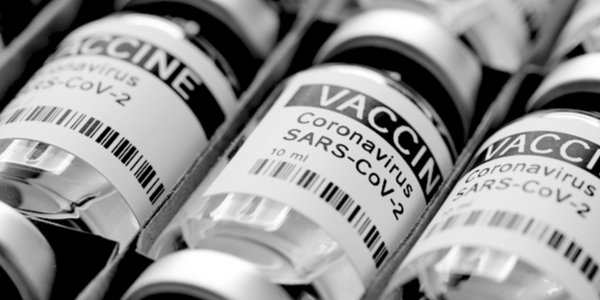A STUDY of millions of citizens shows that covid vaccination ‘significantly increased’ the risks for depression, anxiety, various stress disorders and sleep problems. The same study showed the vaccinations ‘significantly decreased’ the risk for developing bipolar disorder and schizophrenia.
Two South Korean universities randomly selected from the Korean National Health Insurance Service (KNHIS) claims database more than two million (2,154,189) Seoul citizens aged 20 and older who had received two doses of covid vaccines, and 350,983 unvaccinated subjects. Researchers excluded any with a history of schizophrenia, depression, bipolar disorder, anxiety, dissociative, stress related, somatoform (SSD) or psychosomatic disorders (these are mental health conditions where people experience physical symptoms in response to psychological distress), sleep, eating and sexual disorders. This meant excluding almost half a million in the vaccinated group (435,390) and 42,629 in the unvaccinated group. The final number was 1,718,999 vaccinated subjects and 308,354 non-vaccinated subjects.
Post covid infection mental health issues had been studied extensively but not post covid vaccination mental adverse events. This study redressed the balance, and the researchers concluded: ‘Our population-based cohort study provides robust evidence for psychiatric adverse events (AEs) after covid-19 vaccinations. Furthermore, our study provided risks of psychiatric AEs according to vaccine type, revealing that the psychiatric disorders (depression, anxiety, dissociative, stress-related, and somatoform disorders, and sleep disorders) with increased risks due to covid-19 vaccination showed the highest risk in the case of heterogeneous vaccination.’ Heterogenous vaccination means a combination of vaccine types, for example Pfizer combined with AstraZeneca.
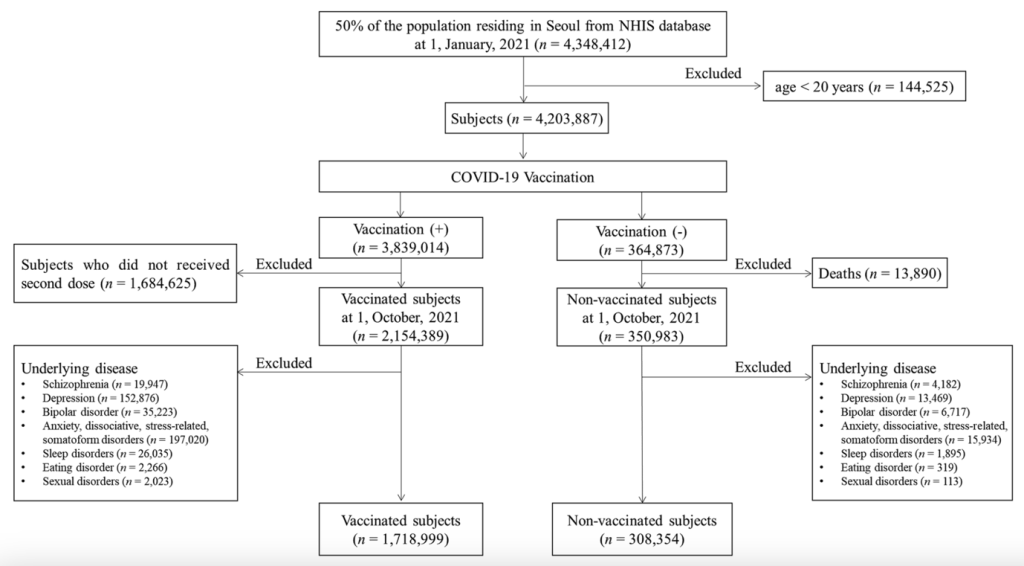
Study flowchart
The results were published in the respected journal Nature and produced by scientists from Inje University Sanggye Paik Hospital and Ewha Womans University Hospital. Scientists assessed 10,000 psychiatric adverse events over one and two weeks, then at one month and three months, and concluded that: ‘Covid-19 vaccination increased the risks of depression, anxiety, dissociative, stress-related, and somatoform disorders, and sleep disorders while reducing the incidence and risk of schizophrenia and bipolar disorder.’ It had no effect on sexual disorders or eating disorders, they said.
They added: ‘Our findings suggested that the relationship between covid-19 vaccination and mental illness may be underestimated along with the complexity of its impact on mental health.’
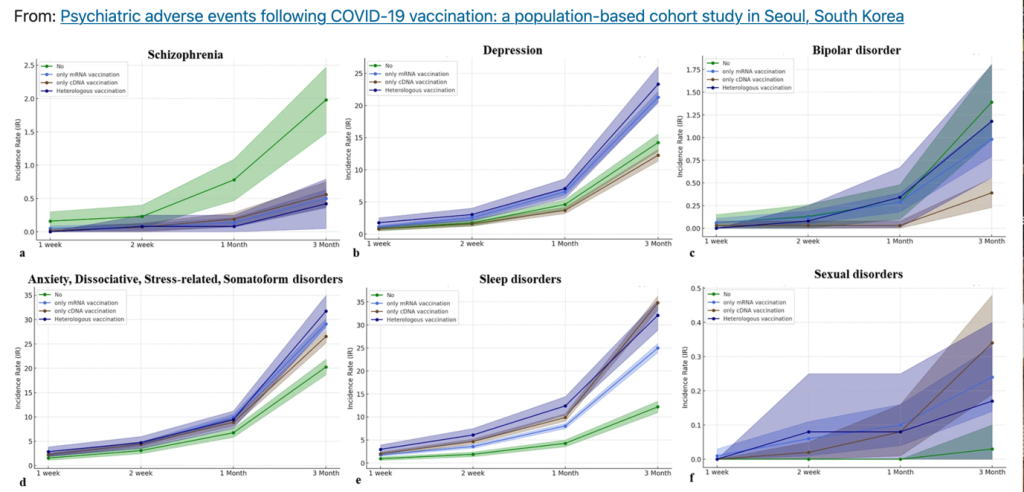
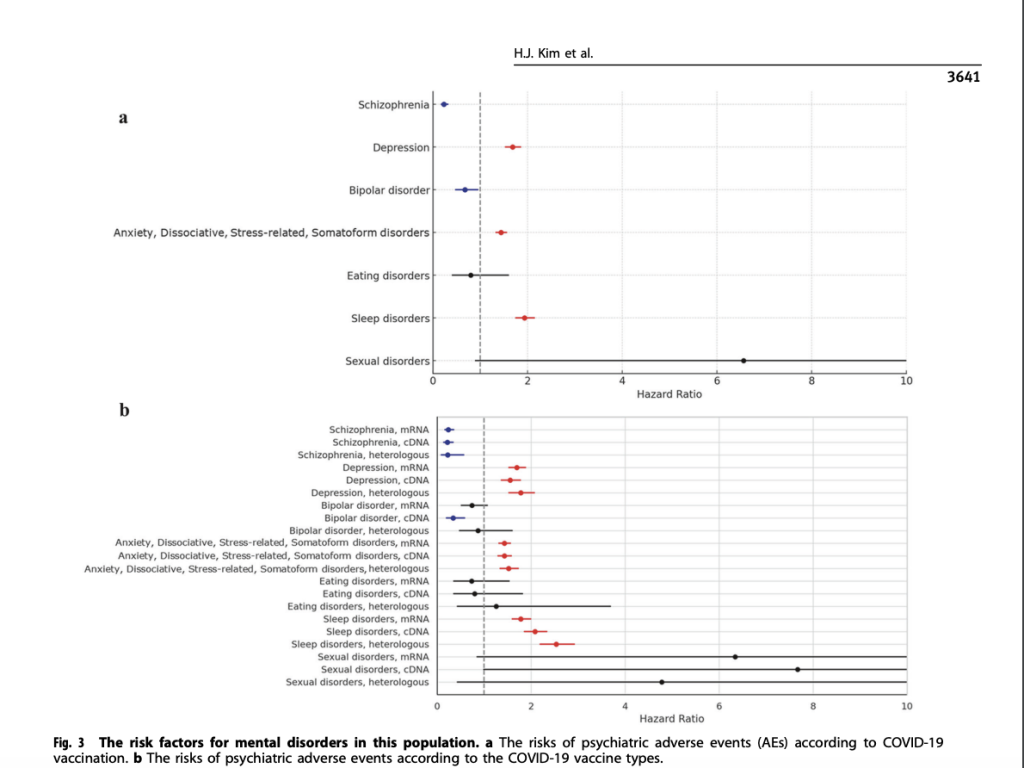
The paper contained no case studies but there are many published, like this one from Indian scientists at the Post Graduate Institute of Medical Education and Research, Chandigarh, India. A pro-vaccine, 18-year-old female student with no history of psychiatric problems, physical illness or substance abuse, and no family history of mental illness, was taken to accident and emergency (A&E) after reacting to her covid vaccination. Family members described her behaviour as bizarre and her conversation confused.
Within three hours of receiving a Covishield, India’s version of the AstraZeneca vaccination, she developed a high fever and diarrhoea. Neither improved with medication. She then became dizzy and disorientated and fell. Her fever subsided the following day, but she developed anxiety, insomnia and petit-mal seizures where she would stare into space.
Over the next four days she was irritable, incoherent, and suffered delusions – she felt persecuted and experienced hallucinations with gods and demons. She tried to run away from home. At their wits end, her family took her back to A&E.
Before being vaccinated, she had no history of seizures, delusions or depression and was on no medication. She tested negative for SARS-CoV-2 and had not had covid. Doctors gave her a battery of blood and urine tests that showed no abnormalities or provided any other explanation for her sudden-onset mental health issues.
A 31-year-old Hispanic male who worked as an office manager, was studied by scientists at Stony Brook University, New York. He had no history of mental illness or physical illness but was taken to A&E by police, exhibiting ‘erratic and bizarre behaviour’. He told nursing staff he was clairvoyant, was talking to dead people and could hear people drumming outside his house. He also heard the constant voice of a co-worker who he believed was his girlfriend although in reality, he was not in a relationship with her. He presented as anxious and guarded and was described by medical staff as ‘superficial and grandiose.’ His symptoms began after receiving his first mRNA covid-19 vaccine and worsened after his second dose.
Both patients are said to have recovered after treatment.
Psychosis has been reported after existing vaccines like rabies, yellow fever, smallpox, typhoid and flu. The award-winning BBC foreign correspondent Malcolm Brabant was in his fifties when he described how he descended into madness after a routine yellow fever vaccine in 2011. He became unwell within hours of receiving the jab and said he endured ‘two years of unimaginable mental torment’ – he was unrecognisable to his family and friends. He heard voices urging him to kill, believed he was the Messiah come to save the world while at the same time believing he was Lucifer. He was convinced that dead relatives urged him to drink his urine or eat his own excrement or brush his teeth with a lavatory brush. He recovered after several years but not before he was given electroconvulsive therapy and attempted suicide.
Sanofi-Pasteur manufactured the yellow fever vaccine he received and although admit to reports of side-effects including mental disorders, said they were ‘rare’ and unlikely to have caused Brabant’s psychosis.
What mechanism can cause mental health issues to appear post-vaccination? There is limited data, but reports indicate that mental health issues could be caused by autoimmune encephalitis – inflammation of the brain caused by the body’s immune system attacking healthy brain cells.
The Stony Brook University researchers said that the disease covid-19 was also linked with psychotic symptoms and that 42 cases had been reported by January 2021. They hypothesised that covid-19 triggered a powerful immune response which resulted in a cytokine storm that could increase the risk of psychosis.
University of Oxford researchers produced the graph below illustrating the increase in mental health outcomes after covid infection. Their study, also published in Nature, said that the unvaccinated had an increased risk of developing psychosis rather than a decreased risk.
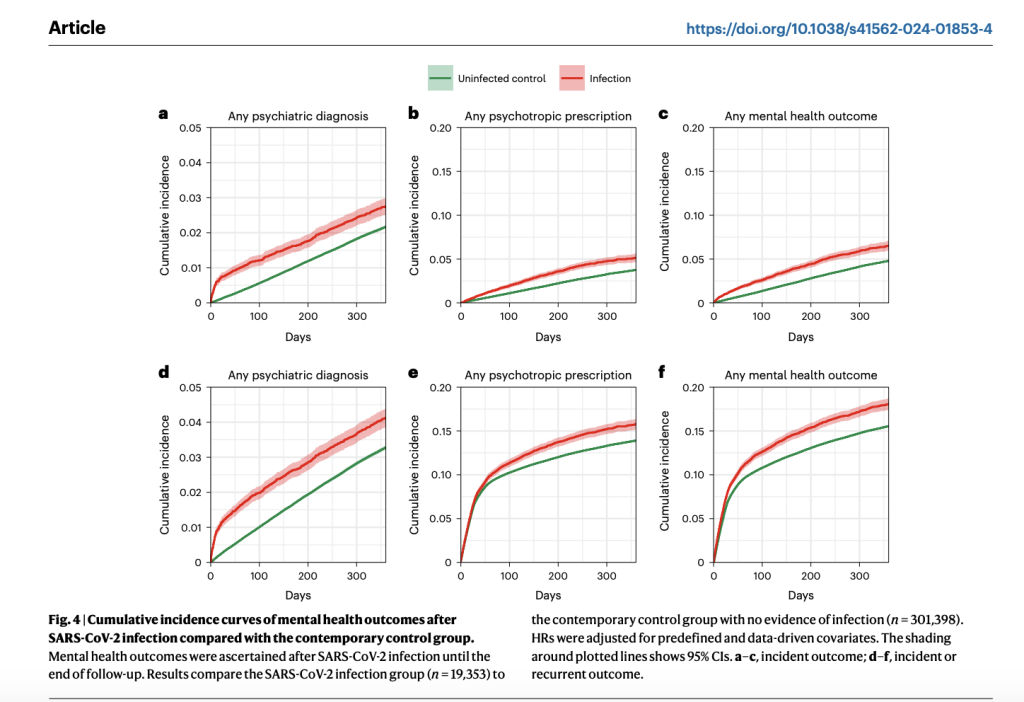
Fear was a huge factor during covid, and the Indian researchers recognised that lockdowns, social distancing, financial insecurity, the fear of getting infected and future uncertainty, contributed to mental health issues. There is no doubt that existing conditions like anxiety, depression, grief, obsessive compulsive disorder, and psychosis worsened as the psyops surrounding the pandemic increased.
However, pandemic onset mental health issues should largely have resolved in the vaccinated who would have been relieved they were protected and looked forward to ‘getting back to normal’. Those who were vaccinated were sure that vaccines were the answer to their problems and would not be the cause of new ones. For that reason alone, the South Korean study is compelling. It showed that mental health issues increased in the vaccinated, rather than decreased as would be expected. It also showed that the unvaccinated, despite being branded granny killers and refuseniks, and under intense psyop pressure to conform, did not develop the same mental health issues.

